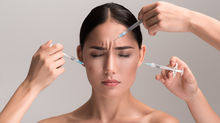What are the Common Side-effects of the Botox Treatment?
- headoffice66
- Apr 10, 2018
- 2 min read

Botox (onabotulinumtoxinA), also known as botulinum toxin type A, is made from the bacteria that induces botulism. Botulinum toxin blocks the nerve activity in the muscles. Botox is used to treat cervical dystonia (severe muscle spasms in the neck muscles). It is also practised to treat muscle spasms (stiffness) in the upper limbs (fingers, wrists, elbows) or lower limbs (toes, ankles). Botox is also used to treat heavy underarm sweating (hyperhidrosis). Botox is popularised with its use for the anti-wrinkle treatment. It’s one of the most effective and favoured anti-wrinkle treatment in all around the globe. But as with every drug, the Botox treatment also may give you some side-effects.
Botox side effects
If you have any signs of an allergic reaction to the Botox, get emergency medical help immediately. These early signs include hives, difficulty in breathing, feeling like you might pass out, swelling of your face, lips, throat, or throat.
The botulinum toxin carried in Botox can spread to other body areas beyond where it was injected. This has caused severe, life-threatening side effects in few people receiving botulinum toxin injections, even for cosmetic purposes. Call your physician promptly if you have any of these temporary side effects, some of which can occur up to several hours to weeks after an injection:
Unusual or severe muscle weakness (especially in a body area that was not injected with the medication)
Having trouble breathing, talking, or swallowing
Loss of bladder control
Hoarse voice, drooping eyelids
Chest pain, irregular heartbeats
Pain or burning sensation while urinating, little or no urination
A sore throat, cough, chest tightness, shortness of breath
Eyelid swelling, drainage or crusting from your eyes, difficulties with vision.

Common Botox side effects may include:
Trouble swallowing for several months after treatment;
Muscle weakness near the injected area
Bruising, bleeding, redness, pain, or swelling where the injection was given;
A headache, neck pain, muscle stiffness, pain in your arms or legs;
Increased sweating in body areas other than the underarms; or
Cold symptoms, nausea, flu symptoms, muscle aches.
The major symptoms of botox treatment such as redness, swelling and bruising can be countered with smart and effective botox aftercare treatment. Proboxin; the botox cream is the ideal solution for the botox aftercare. Designed and formulated by a team of chemists within the UK, Proboxin has the soothing and healing properties which help to diminish the swelling and bruising within few days.
Know more about the product, here: https://www.proboxin.com/scientific-process
























